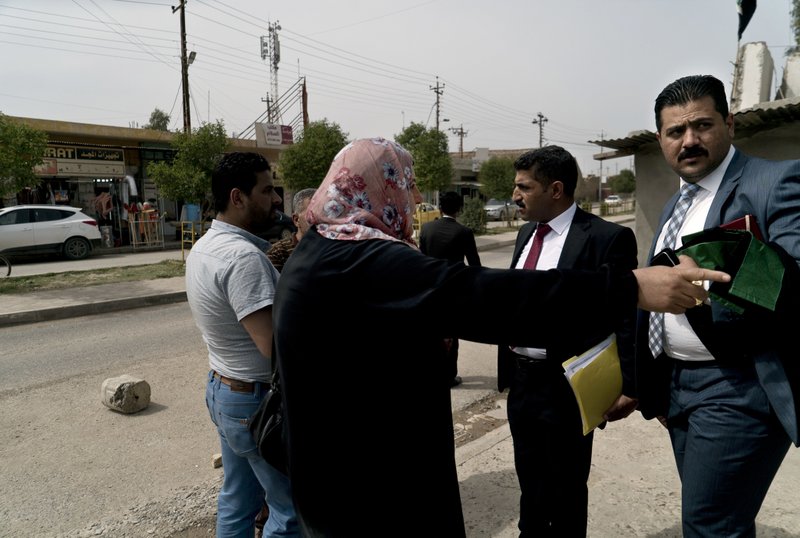TEL KEIF, Iraq -- The entire trial lasted just over half an hour. A grey-haired man was led into the defendant's booth. He fidgeted as the judge read the charges against him: Swearing allegiance to the Islamic State group and working for the militants as an employee at a water station.
"Not guilty," the Sunni Arab defendant, Abdullah al-Jabouri, told the judge in a session of one of Iraq's counterterrorism courts last week. He said he had worked for Nineveh province's water department for more than 20 years and stayed at his post when militants took over in 2014, but he denied ever swearing allegiance to the group.
Soon after, the judge and his two associates went into deliberations. A few minutes later they returned with their verdict: Guilty, sentenced to 15 years in prison. Al-Jabouri, his head bowed, was quickly led out and the next accused Islamic State member was ushered in.
Iraq is holding huge numbers of detainees on suspicion of ties to the Islamic State group -- about 11,000, according to Iraqi officials -- and they are being rushed through counterterrorism courts in trials that raise questions over whether justice is being done. At the same time, families are often left in the dark about where their loved ones are being detained or what their fates are.
Throughout the system, the trials are usually short, often less than 30 minutes, and most end with guilty verdicts. Convictions are based on confessions that defendants and rights groups say intelligence agents extract by intimidation, torture and abuse. Also used as evidence are reports from anonymous informants, raising the possibility of false accusations made as revenge against rivals. The same defense lawyer works dozens of cases, with little knowledge of the defendants.
Moreover, even limited involvement with the Islamic State can bring harsh punishment. Under Iraq's terror law, only three punishments are permitted -- 15 years in prison, life imprisonment or execution by hanging. All verdicts are reviewed by Iraq's Supreme Court.
The swift, truncated sessions reflect in part how Iraq's judicial system has been overwhelmed by the influx of detained Islamic State suspects. Rights groups have long criticized Iraqi courts, saying they struggle to uphold due process. Now they must work through thousands captured in broad sweeps carried out as Iraqi forces retook the northern city of Mosul last year.
Prime Minister Haider al-Abadi, who is running to retain his position in national elections next month, has repeatedly called for death sentences to be sped up. Since 2013, more than 3,000 people convicted on terror charges have been sentenced to death, according to a spreadsheet of Iraqi prison inmates analyzed by the Associated Press. Since 2014, about 250 executions have been carried out. On April 16, the government announced it had executed 11 militants.
The heavy-handed, broad-brush crackdown in the courts threatens to further alienate Iraq's Sunni Arab minority. Sunnis were the main community living under the Islamic State group's rule, both its recruiting base and its victims.
Some actively supported the group, joining its ranks as fighters or taking up significant positions in the government it created. But tens of thousands more worked with the group because they had no choice, either forced to cooperate or dependent on government jobs that now fell under the militants' control.
Over the past year, the court has issued more than 815 verdicts on terrorism charges, said court spokesman Abdul Satar Bayraqdar. Of those, 112 were acquitted, 201 were sentenced to death, 150 to life in prison, and 341 to 15 years in prison. He said 1,715 detainees were released without trial. The most recent death sentence was issued April 19, to a man convicted of serving as a judge for the Islamic State group, he said.
Meanwhile, the families of the thousands of Sunni Arabs in custody are largely in the dark about their loved ones' fates. Most are never even told where their relatives are being detained and rely on word of mouth to gain information.
Two former detainees reported harrowing conditions in Iraqi detention -- from overcrowding and scabies outbreaks to improvised toilets made from plastic bags and water bottles.
Up the road from the courthouse in Tel Keif, a prison holds some 1,500 people, most waiting for trial.
Outside the courtroom, one Iraqi woman came early, hoping for the chance to see her son, Kahtan, a 28-year-old doctor who was arrested in Mosul in the spring of 2017. She asked to be identified as Umm Kahtan, Arabic for Kahtan's mother, for fear of reprisals by colleagues and neighbors.
She had been able to retain a lawyer, who had notified her about the trial session. After a sleepless night of prayer and reading the Koran, she arrived at the court at 7:30 a.m., ahead of its opening at 9 a.m. She brought a plastic bag of documents in her purse and two witnesses to attest to her son's character.
She waited all day in the sun, refusing offers to sit. Finally, at 2 p.m., the end of the work day, her lawyer walked out with a group of colleagues on the way to lunch. The case had been delayed, he told her.
Umm Kahtan rejoiced. At least today he would not be sentenced.
Information for this article was contributed by Lee Keath, Mouhammad Nouman, Balint Szlanko, Ahmed Sami and Maamoun Youssef of The Associated Press.
A Section on 04/30/2018

